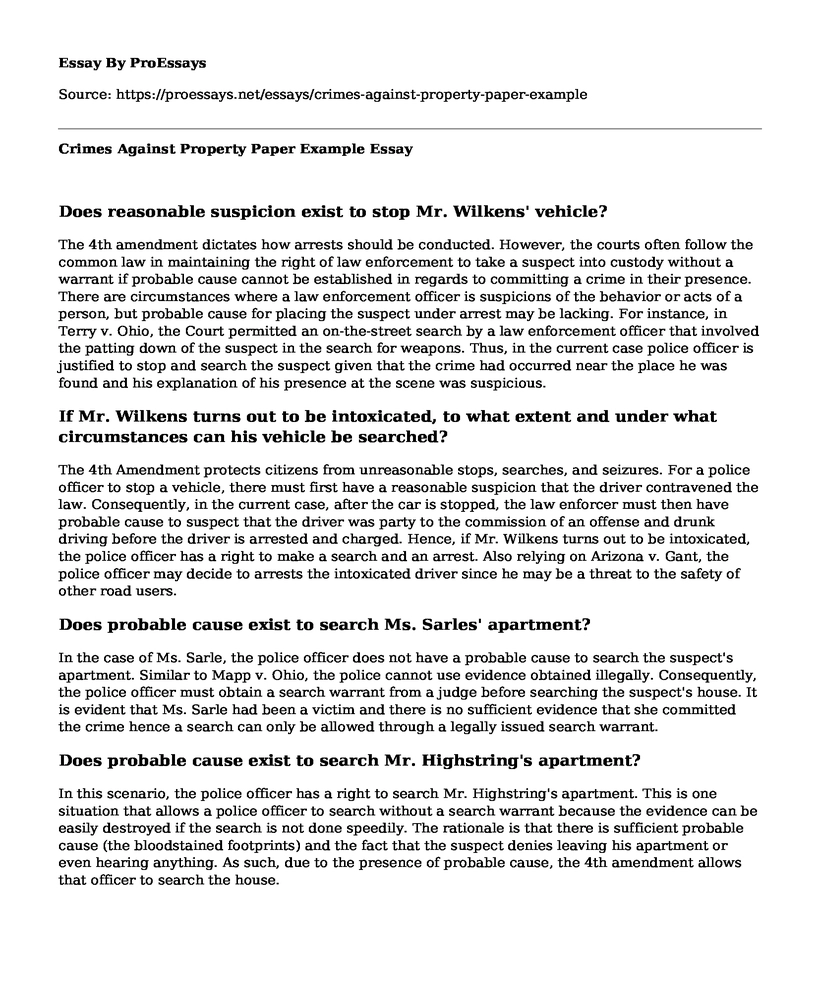Does reasonable suspicion exist to stop Mr. Wilkens' vehicle?
The 4th amendment dictates how arrests should be conducted. However, the courts often follow the common law in maintaining the right of law enforcement to take a suspect into custody without a warrant if probable cause cannot be established in regards to committing a crime in their presence. There are circumstances where a law enforcement officer is suspicions of the behavior or acts of a person, but probable cause for placing the suspect under arrest may be lacking. For instance, in Terry v. Ohio, the Court permitted an on-the-street search by a law enforcement officer that involved the patting down of the suspect in the search for weapons. Thus, in the current case police officer is justified to stop and search the suspect given that the crime had occurred near the place he was found and his explanation of his presence at the scene was suspicious.
If Mr. Wilkens turns out to be intoxicated, to what extent and under what circumstances can his vehicle be searched?
The 4th Amendment protects citizens from unreasonable stops, searches, and seizures. For a police officer to stop a vehicle, there must first have a reasonable suspicion that the driver contravened the law. Consequently, in the current case, after the car is stopped, the law enforcer must then have probable cause to suspect that the driver was party to the commission of an offense and drunk driving before the driver is arrested and charged. Hence, if Mr. Wilkens turns out to be intoxicated, the police officer has a right to make a search and an arrest. Also relying on Arizona v. Gant, the police officer may decide to arrests the intoxicated driver since he may be a threat to the safety of other road users.
Does probable cause exist to search Ms. Sarles' apartment?
In the case of Ms. Sarle, the police officer does not have a probable cause to search the suspect's apartment. Similar to Mapp v. Ohio, the police cannot use evidence obtained illegally. Consequently, the police officer must obtain a search warrant from a judge before searching the suspect's house. It is evident that Ms. Sarle had been a victim and there is no sufficient evidence that she committed the crime hence a search can only be allowed through a legally issued search warrant.
Does probable cause exist to search Mr. Highstring's apartment?
In this scenario, the police officer has a right to search Mr. Highstring's apartment. This is one situation that allows a police officer to search without a search warrant because the evidence can be easily destroyed if the search is not done speedily. The rationale is that there is sufficient probable cause (the bloodstained footprints) and the fact that the suspect denies leaving his apartment or even hearing anything. As such, due to the presence of probable cause, the 4th amendment allows that officer to search the house.
If you could search Mr. Highstrings's apartment and his person, what types of evidence would you need to establish probable cause to arrest him?
The type of evidence that one would need to arrests Mr. Highstrings is the blood sample and the presence of a gun in the apartment. The blood sample should be collected for forensic analysis to identify the person it belonged to. On its part, the gun should undergo a ballistic analysis to establish when it was fired and also to try and match the bullet with the bullet wound that killed the victim.
At what point would you be required to give Mr. Highstring his rights under Miranda?
Before making the arrest and after collecting sufficient evidence, the police officer must inform the suspect about his Miranda rights (Miranda v. Arizona). The suspect must be advised of his right to an attorney as well as to remain silent as anything they say can be used as evidence against them in a court of law.
References
Arizona v. Gant, 556 U.S. 332 (2009)
Draper v. United States, 358 U.S. 307 (1959)
Mapp v. Ohio, 367 U.S. 643 (1961)
Miranda v. Arizona, 384 U.S. 436
Terry v. Ohio, 392 U.S. 1 (1968)
The 4th, 5th, and 6th Amendments
Cite this page
Crimes Against Property Paper Example. (2022, Aug 05). Retrieved from https://proessays.net/essays/crimes-against-property-paper-example
If you are the original author of this essay and no longer wish to have it published on the ProEssays website, please click below to request its removal:
- Ballot Proposition in California Essay
- Master's in Crime Scene Investigation Essay
- The Criminal Case of John Wayne Gacy Paper Example
- National Security and Online Privacy Dilemma With Annotated Bibliography
- Essay on the Unrewarded Labor of African Americans: A Trace of Economic History
- Facebook Live Killings Essay
- Paper Example on Analysis of MLK's Speech 'I've Been to the Mountaintop'







